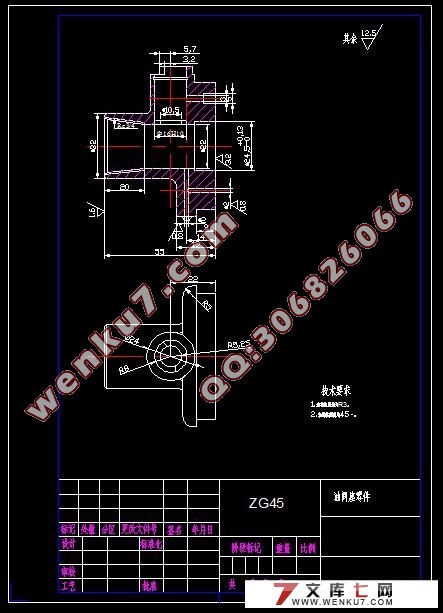摘 要
制造业中尤其是机械制造业,在产品生产过程中按照特定工艺,不论其生产规模如何,都需要种类繁多的工艺装备,而制造业产品的质量、生产率、成本无不与工艺装备有关。随着不规则形状零件在现代制造业中的广泛应用,如何保证这类零件的加工精度就显得尤为重要。本文通过分析注油器油阀座零件的结构特点和加工要求,制定了一套较合理的夹具设计,从而为保证该零件的加工精度将提供一种经济实用的工艺装备,具有一定的实用价值。对于夹具设计来说,最重要的就是定位、夹紧方案的确定。通过对各种定位夹紧装置的分析比较,选择并组合了一套既能够满足加工要求的,又比较简洁的装置。同时,通过对一系列定位误差和夹紧力的计算,验证了该零件的加工是可以保证其要求的精度的,它的加工误差在规定的范围内。通过夹紧力的计算,也验证了零件在被夹紧的前提下,它受到的夹紧力也并不大,满足夹具设计所要求的既要保证一定的夹紧力不使工件在加工过程中发生位移,但同时又不能过大致使工件发生变形。
关键词:工艺装备,夹具设计,定位,夹紧
Abstract
In the manufacturing sector in particular, mechanical manufacturing, products in the production process in accordance with the specific process, regardless of their scale of production, requires a wide range of process equipment, manufacturing and product quality, productivity, cost and process all the relevant equipment. With the irregular shape of the parts in the modern manufacturing industry in a wide range of applications, how to ensure that this type of precision machining of parts is particularly important. Through analysis of the oil-seat oiling parts of the structure and characteristics of the processing requirements of the development of a more reasonable fixture design, so as to guarantee the precision machining of parts will provide an economical and practical technology equipment, has some practical value. The fixture design, the most important thing is positioning, clamping identification program. By targeting a variety of clamping devices analyzed and compared, and choose a combination of both to meet the demands of processing, and the relatively simple device. At the same time, through a series of clamping force and positioning errors of calculation, parts of the verification process is required to ensure its accuracy, its error in the processing requirements. Clamping force through the calculation, but also to verify the parts in the clamp on the premise of it by the clamping force is not large, the fixture design to meet the required not only to ensure a certain degree of clamping force not to work during processing Shifted, but at the same time, not too much work led to deformation occurred.
Key words: technology equipment, fixture design, positioning, clamping
引言
夹具是涵盖了从加工到组装的几乎所有操作过程的一种装夹设备。装夹最重要的标准是位置精度、工件稳定性、最小工件变形和最小位移,以及夹具和切割工具之间无干涉等要求。由于大量的加工操作需要装夹,夹具设计在制造系统中就变得非常重要,它直接影响加工质量,生产率和制造成本。在机床上加工工件时,为了保证工件在该工序所加工的表面能达到图纸上规定的尺寸及位置精度等技术要求,必须使得工件相对于刀具和机床占有正确的加工位置(即工件的定位),并把工件压紧夹牢,以便在加工过程中,工件受到切削力、离心力的作用及冲击、振动等影响时,能保持这个确定了的位置稳定不变(即工件的夹紧)。在机床上对工件进行定位和夹紧,称做装夹。一切能使工件在机床上实现定位和夹紧的工艺装置,一般称为机床夹具,简称夹具。
机床夹具按专门化程度分通用夹具、专用夹具、可调整夹具、专门化拼装夹具和自用化生产用夹具。通用夹具是指已经标准化,且具有较大适用范围的夹具。它由专业厂生产供应,有的已作为机床附件与通用机床配套,这类夹具主要用于单件小批生产。专用夹具是根据零件工艺机械加工过程中的某一道工序而专门设计的夹具。由于不考虑通用性,故结构紧凑、操作方便。这类夹具可保证高的加工精度和生产率。但这类夹具的针对性很强。本文通过分析注油器油阀座零件的结构特点和加工要求,制定了一套较合理的夹具设计,从而为保证该零件的加工精度将提供一种经济实用的工艺装备,具有一定的实用价值。对于夹具设计来说,最重要的就是定位、夹紧方案的确定。通过对各种定位夹紧装置的分析比较,选择并组合了一套既能够满足加工要求的,又比较简洁的装置。
1零件的分析
1.1零件的生产类型
该油阀座的实际生产纲领:
N=Qn(1+α+β)
=5×1×(1+3%+1%)
=5.495(万件)
该零件的生产规模划规为大批量生产。
1.2 零件的作用
油阀座是凿岩机注油器上的重要零件。左端通过Rc3/4与主机联接;右端以Ф63mm外圆定位与油壶壳体相连,一管套穿过油壶壳体与Ф24.5+0.13mm孔焊接,高压气体从左端进入阀座,在负压作用下,油壶内油从Ф2mm孔流至Ф22mm孔与高压气体混合后成雾状从管道喷出。Ф16H10孔装入油量调节装置,缺口标志油量调节范围。
1.3 零件的工艺分析
由零件图得知其材料为ZG45。该材料具有较高的强度,耐磨性,耐热性及件振性;适用于承受较大应力,要求耐磨的零件。
该零件上的主要加工面为表面轮廓,两端面,三个平衡孔和主轴孔。
该零件表面轮廓应在一次装夹下同时加工出来。该零件三个平衡孔应在一次装夹下同时加工出来。
有关面和孔加工的经济精度及机床能达到的位置精度可知,上述技术要求是可达到的,零件的结构工艺性也是可行的。

目 录
摘要……………………………………………………………………………………………………………(1)
引言……………………………………………………………………………………………………………(2)
第一章 零件的分析…………………………………………………………………………………………(3)
1.1 零件的生产类型…………………………………………………………………………………………(3)
1.2 零件的作用………………………………………………………………………………………………(3)
1.3零件的工艺分析…………………………………………………………………………………………(3)
第二章 工艺规程设计 ……………………………………………………………………………………(3)
2.1 确定毛坯…………………………………………………………………………………………………(3)
2.2定位基准的选择…………………………………………………………………………………………(4)
2.3加工工艺路线……………………………………………………………………………………………(4)
2.4选择加工设备及刀、夹、量具…………………………………………………………………………(5)
2.5机械加工余量 …………………………………………………………………………………………(5)
2.6确定切削用量和基本工时………………………………………………………………………………(6)
第三章 夹具的设计 ………………………………………………………………………………………(13)
3.1 钻夹具设计 ……………………………………………………………………………………………(13)
3.2 铣夹具设计……………………………………………………………………………………………(13)
3.3 镗夹具设计……………………………………………………………………………………………(15)
3.4 钻夹具设计……………………………………………………………………………………………(17)
第四章 夹具的概述………………………………………………………………………………………(18)
4.1夹具的作用及分类 ……………………………………………………………………………………(18)
4.2 夹具的组成 …………………………………………………………………………………………(19)
4.3 工件夹紧的基本要求…………………………………………………………………………………(20)
4.4 夹具的发展趋势………………………………………………………………………………………(21)
结论 …………………………………………………………………………………………………………(21)
致谢…………………………………………………………………………………………………………(22)
参考文献 ……………………………………………………………………………………………………(22)
|



